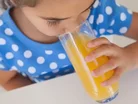Juice sales set to fall 7% by 2021 as sugar worries deepen

A recent report has shown that the juice market in the United States is set to decline by 7% between 2016 and 2021, due to consumer concerns over high sugar content.
The research by Mintel has show that sales are declining, with one in five juice buyers saying juice contains too much sugar to be considered healthy.
It’s the same fear which has crippled the soda industry in recent years and the juice market which is valued at $19.8 million is expected to decline significantly over the next four years.
The core customer base for juice is parents, with 90% of parents aged under-45 having bought a 100% juice product between December 2016 and February of this year, compared to three-quarters of non-parents, but Mintel expects these purchasing patterns to shift as concerns over juice's nutritional value continue to grow.
The American Academy of Pediatrics has recently warned that children less than a year old should not consume fruit juice. The organization's claims that the beverage can increase the risk of cavities in children, and that its lack of protein and fiber could promote inappropriate weight gain is likely to heighten concerns.
In particular, AAP's assertion that orange juice contains about the same amount of calories as sugar-sweetened soda, could have a massively destabilizing effect.
It said in its report: “Fruit juice offers no nutritional benefits over whole fruit for infants and children and has no essential role in healthy, balanced diets of children."
Juice makers know that there is now a need to combat consumer concerns in the market, and so they have begun to mimic the ways flavored waters and health drinks position themselves. It’s thought that juices with reduced sugar or organic offerings and juice hybrid products, could help revive the fortunes of the juice industry.
There will now be a need to innovate, but whether manufacturers can squeeze enough new interest out of the market comes down to restoring consumer confidence and it remains to be seen whether that can happen.
Tags
food trends- 5 minutes with: Eric Liu, founder and CEO of HungryPandaFranchising
- CEO of Olio Tessa Clarke wins Bold Woman Award 2023Food
- EU agri-food trade reaches a new record within imports and exports in 2017, report statesFood
- Catalina and Label Insight partner up to offer marketing based on dietary needsRetail



